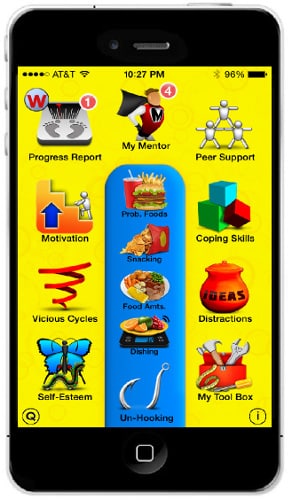 Childhood Obesity News has, not surprisingly, published quite a few posts about Dr. Pretlow’s innovative W8Loss2Go smartphone application. For review purposes, here is a handy guide to many of them, all in one place.
Childhood Obesity News has, not surprisingly, published quite a few posts about Dr. Pretlow’s innovative W8Loss2Go smartphone application. For review purposes, here is a handy guide to many of them, all in one place.
Dr. Pretlow’s Huffington Post Guest Appearance
W8Loss2Go Study in Adelaide, Australia
Following Along with W8Loss2Go
Letter to a Teen, about W8Loss2Go
Why might a person want to have another look at this information? Because the fourth W8Loss2Go pilot study is about to begin, and is in fact still accepting applicants. Are you a person (or the parent of a person) between 8 and 20 years of age and able to make 4 trips to Northwest University in Kirkland, Washington? All the information about the upcoming study is on a page appropriately titled “Weight Loss App Pilot Study Information,” which also includes a link to the secure application form page.
The main thing to know is that the W8Loss2Go smartphone app uses a new approach that enables a person to stop experiencing food cravings and quell the urges to snack between meals, and to take sustainable baby steps toward smaller meals.
Just to round this out, we include an excerpt from Dr. Pretlow’s current LinkedIn profile in the Publications section:
OVERWEIGHT: What Kids Say
CreateSpace Publishing
April 24, 2010
Overweight kids are seldom heard and poorly understood. This book presents what kids say about being overweight—their stories, struggles, and successes—in their own words. The source is 134,000 messages anonymously posted by overweight kids on website bulletin boards. With stunning honesty these kids share their difficult lives and their frustration with parents and health professionals.
Treatment of Child/Adolescent Obesity Using the Addiction Model: A Smartphone App Pilot Study
Mary Ann Liebert Publishing
June 2, 2015
This publication reports on a new weight loss program for young people, based on classic addiction medicine withdrawal/abstinence techniques and behavioral addiction treatment methods. The approach consists of staged, incremental food withdrawal, involving specific “problem foods,” snacking elimination (non-specific foods), and portion reduction at meals.
Addiction to Highly Pleasurable Food as a Cause of the Childhood Obesity Epidemic: A Qualitative Internet Study
Eating Disorders
July 21, 2011
This paper presents a prospective, 10 year, qualitative study of messages written by overweight/obese 8-to-21 year olds on an intervention website. Responders frequently described their relationship with food in a manner that was consistent with the DSM-IV criteria for substance dependence, and 66% of participants reported feeling addicted to food.
Your responses and feedback are welcome!
Image by W8Loss2Go

 FAQs and Media Requests:
FAQs and Media Requests: 











